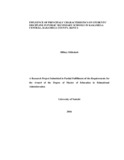| dc.description.abstract | The purpose of the study was to investigate the influence of principals’ characteristics on student discipline in public secondary schools in Kakamega central, Kakamega County, Kenya. The objectives of the study were: to establish the extent to which principals’ academic qualification, administrative experience, gender and marital status influence student discipline in Kakamega central, Kakamega county, Kenya. Descriptive survey design was used to carry out the study.The target population of the teachers was 500. The study was based on functional leadership theory developed by Hackman and Walton (1986). The target population was all 25 public secondary schools in Kakamega central, Kakamega County, Kenya. The sample consisted of 120 respondents 20 principls and 100 teachers. Purposive sampling was used to sample the schools while simple random sampling was used to sample the teachers in the schools. The data was collected by use of two sets of questionnaires:principals and teachers which were analysed using descriptive statistics and inferential statistics like analysis of variance(ANOVA) and student t-test. ANOVA was done to analyse the first, second and fourth research question while Pearson correlation coefficient was used to analyse the third research questions.A positive correlation of a coefficient of 0.204 and respectively were found. The findings indicated that a majority of principals said that academic qualification influenced students' discipline in public secondary schools. Administrative experience also influenced students' discipline by 83.3% of the principals saying that it influenced students' discipline. Principals' gender may have influenced students' discipline with 47.4% of the principals saying that gender influenced student discipline with a correlation coefficient of 0.204 which is a positive correlation. Principals' marital status influenced students' discipline with majority of the principals saying that marital status influenced students' discipline by 38.9% by a high rate and a positive correlation with a coefficient of 0.45. The following were the conclusions of the study. Principals' academic qualification influenced students' discipline, principals' administrative experience influenced student discipline since those with administrative experience had less issues of discipline cases. Principals’ gender influenced student discipline with male principals known to follow the rules and lastly marital status influenced students discipline because married couples tend to be more understanding. Recommendations such as appointments of principals should be made based on principals’ academic qualification, all principals should have administrative experience specifically as class teacher, H.O.D and Deputy inoder to handle matters of discipline effectively. Principals’ gender should be one of the priorities especially when appointing principals inorder to foster equality and encourage students and lastly principals marital status should be taken into consideration especially during appointment. | en_US |



